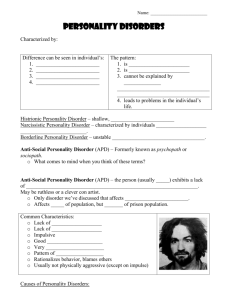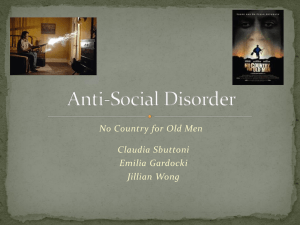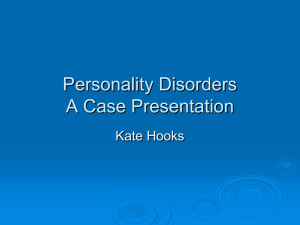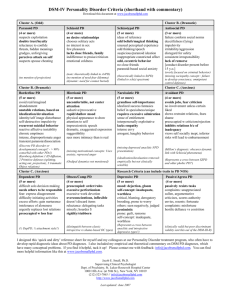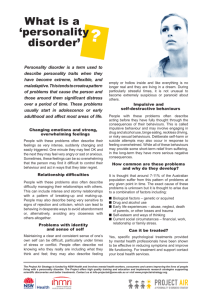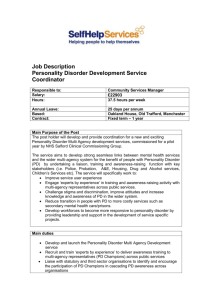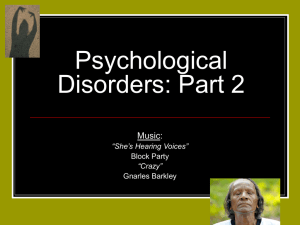Personality Disorders
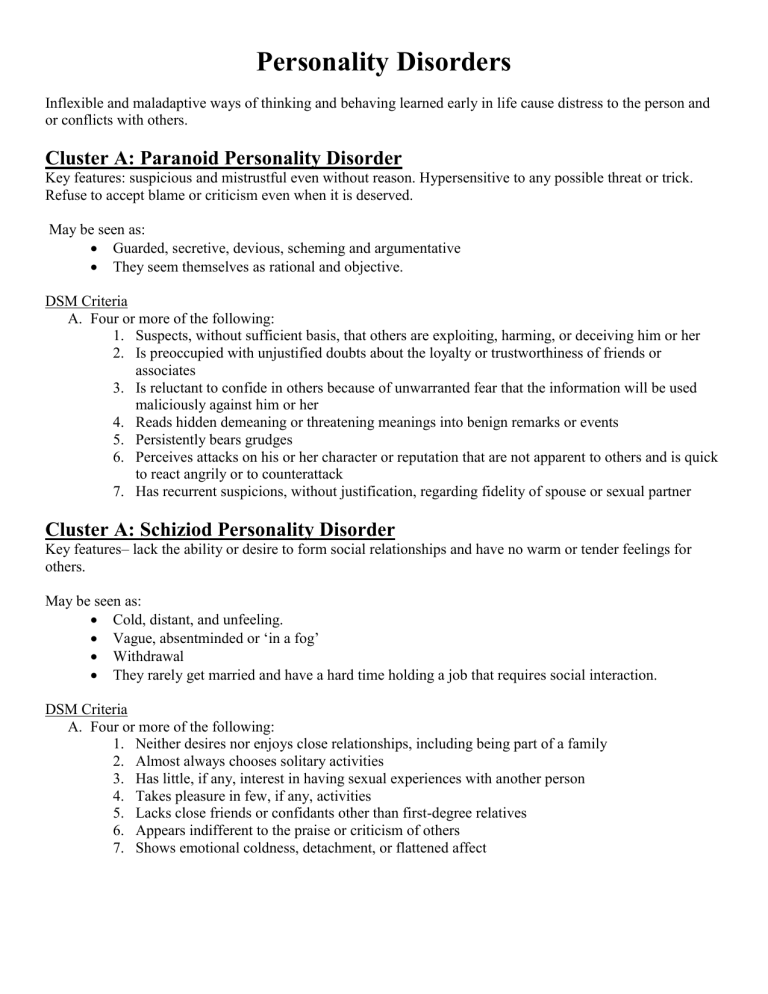
Personality Disorders
Inflexible and maladaptive ways of thinking and behaving learned early in life cause distress to the person and or conflicts with others.
Cluster A: Paranoid Personality Disorder
Key features: suspicious and mistrustful even without reason. Hypersensitive to any possible threat or trick.
Refuse to accept blame or criticism even when it is deserved.
May be seen as:
Guarded, secretive, devious, scheming and argumentative
They seem themselves as rational and objective.
DSM Criteria
A.
Four or more of the following:
1.
Suspects, without sufficient basis, that others are exploiting, harming, or deceiving him or her
2.
Is preoccupied with unjustified doubts about the loyalty or trustworthiness of friends or associates
3.
Is reluctant to confide in others because of unwarranted fear that the information will be used maliciously against him or her
4.
Reads hidden demeaning or threatening meanings into benign remarks or events
5.
Persistently bears grudges
6.
Perceives attacks on his or her character or reputation that are not apparent to others and is quick to react angrily or to counterattack
7.
Has recurrent suspicions, without justification, regarding fidelity of spouse or sexual partner
Cluster A: Schiziod Personality Disorder
Key features– lack the ability or desire to form social relationships and have no warm or tender feelings for others.
May be seen as:
Cold, distant, and unfeeling.
Vague, absentminded or ‘in a fog’
Withdrawal
They rarely get married and have a hard time holding a job that requires social interaction.
DSM Criteria
A.
Four or more of the following:
1.
Neither desires nor enjoys close relationships, including being part of a family
2.
Almost always chooses solitary activities
3.
Has little, if any, interest in having sexual experiences with another person
4.
Takes pleasure in few, if any, activities
5.
Lacks close friends or confidants other than first-degree relatives
6.
Appears indifferent to the praise or criticism of others
7.
Shows emotional coldness, detachment, or flattened affect
Cluster B: Antisocial Personality Disorder
Key features: a pattern of violent, criminal, or unethical and exploitative behavior and an inability to feel affection for others. One of the most widely studied. Please note that extreme forms of ASPD are referred to as
Psychopathic Personality Disorder as defined by the patient’s score on Hare’s Psychopathy Checklist-Revised
May be seen as
Lie, steal, cheat and show little or no sense of responsibility or remorse.
Con man
They are likely to blame society or their victims for the antisocial actions that they themselves commit
3% of American men and 1% of women
Prevalence is high among prison inmates. 50%?
DSM Criteria
A.
Three or more of the following recurring since age 15
1.
Failure to conform to social norms with respect to lawful behaviors as indicated by repeatedly performing acts that are grounds for arrest
2.
Deceitfulness, as indicated by repeated lying, use of aliases, or conning others for personal profit or pleasure
3.
Impulsivity or failure to plan ahead
4.
Irritability and aggressiveness, as indicated by repeated physical fights or assaults
5.
Reckless disregard for safety of self or others
6.
Consistent irresponsibility, as indicated by repeated failure to sustain consistent work behavior or honor financial obligations
7.
Lack of remorse, as indicated by being indifferent to or rationalizing having hurt, mistreated, or stolen from another
B. At least 18 years old
C. Evidence of Conduct Disorder with onset before age 15 (Only disorder that requires symptoms of another disorder to be present)
D. Not exclusively during the course of Schizophrenia or a Manic Episode
Causes of Antisocial Personality Disorder
1. Biological factors: Predisposition – genetics and or certain neurotransmitters that make us more aggressive.
Autonomic nervous system is less responsive to stress. Thus more likely to seek thrill-seeking activities that are harmful to themselves and others. Punishment is less effective. Damage to the prefrontal region of the brain during infancy.
2. Psychological factors: Adverse psychological factors - emotional deprivation, a child for whom no one cares, cares for no one. Arrested moral development.
3. Social Factors: unhealthy social environment – rejection from one or both parents. Learned antisocial behavior. Serious behavior leads to rejection by peers and failure in school, and affiliation with others who exhibit behavior.
Cluster B: Borderline Personality Disorder
Key features: marked instability in self-image, mood, and interpersonal relationships. Common and serious.
May be seen as
Impulsive and often self-destructive (promiscuity, drugs, threats of suicide)
They often manipulate their self-destructive ways in order to control or solidify their personal relationships.
DSM Criteria
A.
Five or more of the following:
1.
Frantic efforts to avoid real or imagined abandonment
2.
Pattern of unstable and intense interpersonal relationships characterized by alternating between extremes of idealization and devaluation
3.
Identity disturbance: markedly and persistently unstable self-image or sense of self
4.
Impulsivity in at least two areas that are potentially self-damaging
5.
Recurrent suicidal behavior or self-mutilating behavior
6.
Affective instability due to a marked reactivity of mood
7.
Chronic feelings of emptiness
8.
Inappropriate, intense anger or difficulty controlling anger
9.
Transient, stress-related paranoid ideation or severe dissociative symptoms
Causes of Borderline Personality Disorder
1. Biological factors: Might run in families but not seen as significant role. It is however, accompanied by mild forms of brain dysfunction and schizophrenic-like conditions and mood disorders.
2. Psychological factors: Most research points to dysfunctional relationships with parents (even a pervasive lack of supervision), frequent exposure to domestic violence, and physical and or sexual abuse.
3. Social Factors: Trauma
Cluster B: Narcissistic Personality Disorder
Key features: the person has an exaggerated sense of self-importance and needs constant admiration.
May be seen as
Grandiose sense of self importance and a preoccupation with fantasies of unlimited success.
Believe they are extraordinary
Need constant attention
Display a sense of entitlement
Tend to exploit others
They are given to envy and arrogance and lack the ability to really care for anyone.
DSM Criteria
A.
Five or more of the following:
1.
Has a grandiose sense of self-importance
2.
Is preoccupied with fantasies of unlimited success, power, brilliance, beauty, or ideal love
3.
Believes that he or she is “special” and unique and can only be understood by, or should associate with, other special or high-status people
4.
Requires excessive admiration
5.
Has a sense of entitlement (i.e. unreasonable expectations of favorable treatment or others complying to their expectations)
6.
Takes advantage of others
7.
Lacks empathy: is unwilling to recognize or identify with the feelings and needs of others
8.
Is often envious of others or believes that others are envious of him/her
9.
Shows arrogant, haughty behaviors or attitudes
Cluster C: Avoidant Personality Disorder
Key features: the person’s fear of rejection from others leads to social isolation.
May be seen as
Timid, anxious, and fearful of rejection
Unlike the schizoid type the person wants the relationships.
DSM Criteria
A.
Four or more of the following:
1.
Avoids occupational activities that involve significant interpersonal contact, because of fears of criticism, disapproval, or rejection
2.
Is unwilling to get involved with people unless certain of being liked
3.
Shows restraint within intimate relationships because of the fear of being shamed or ridiculed
4.
Is preoccupied with being criticized or rejected in social situations
5.
Is inhibited in new interpersonal situations because of feelings of inadequacy
6.
Views self as socially inept, personally unappealing, or inferior to others
7.
Is unusually reluctant to take personal risks or to engage in any new activities because they may prove embarrassing
Cluster C: Dependent Personality Disorder
Key features: the person is unable to make choices and decisions independently and cannot tolerate being alone.
May be seen as
Rely on parents, spouse, or friends to make major choices
Very unhappy when alone
Underlying fear that they will be rejected by the key people in their lives.
DSM Criteria
A.
Five or more of the following:
1.
Has difficulty making everyday decisions without an excessive amount of advice and reassurance from others
2.
Needs others to assume responsibility for most major areas of his or her life
3.
Has difficulty expressing disagreement with others because of fear of loss of support or approval
4.
Has difficulty initiating projects or doing things on his or her own (because of a lack of selfconfidence rather than a lack of motivation or energy)
5.
Goes to excessive lengths to obtain nurturance and support from others, to the point of volunteering to do things that are unpleasant
6.
Feels uncomfortable or helpless when alone because of exaggerated fears of being unable to care for himself or herself
7.
Urgently seeks another relationship as a source of care and support when a close relationship ends
8.
Is unrealistically preoccupied with fears of being left to take care of himself or herself
Cluster C: Obsessive-Compulsive Personality Disorder
DSM Criteria
A.
Four or more of the following
1.
Is preoccupied with details, rules, lists, order, organization, or schedules to the extent that the major point of the activity is lost
2.
Shows perfectionism that interferes with task completion
3.
Is excessively devoted to work and productivity to the exclusion of leisure activities and friendships
4.
Is overconscientious, scupulous, and inflexible about matters of morality, ethics, or values
5.
Is unable to discard worn-out or worthless objects even when they have no sentimental value
6.
Is reluctant to delegate tasks or to work with others unless they submit to exactly his or her way of doing things
7.
Adopts a miserly spending style toward both self and others, money is viewed as something to be hoarded for future catastrophes
8.
Shows rigidity and stubornness
